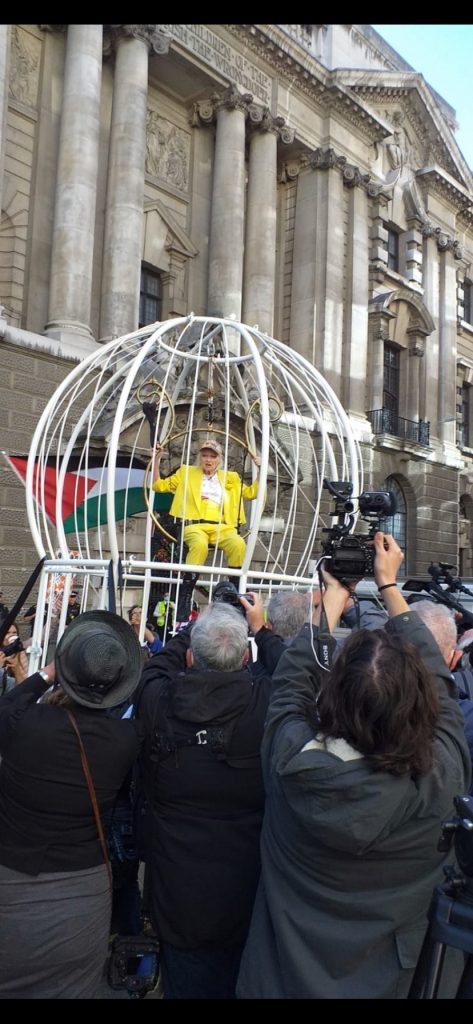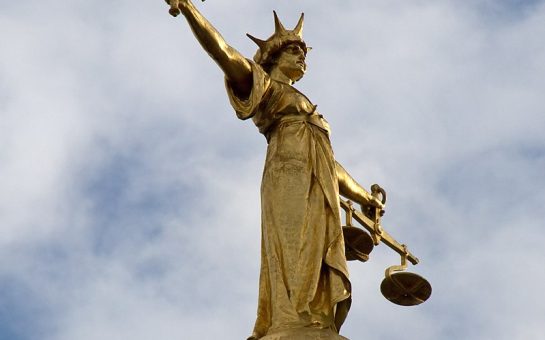Neil Dorgan
July 28 2020, 16.00
Follow @SW_Londoner
A group of dedicated supporters continued their weekly protest, in support of Julian Assange, outside Belmarsh Prison on Saturday afternoon.
Mr Assange has been held in Belmarsh Prison, a high-security Category-A prison in south London, in connection with a US extradition request on espionage charges, since April 11 2019.
The protestors, including several members of the grassroots solidarity ‘Committee to Defend Julian Assange’ campaign, held up banners and distributed leaflets to passing motorists, in support of Mr Assange.
Joe Brack, a member of the Julian Assange Defence Committee, said: “The Saturday vigil has been going on for quite a few months now just to keep in mind that Julian Assange is in this Borough of Woolwich, in the super-maximum-security prison, and we won’t tolerate it because he is a journalist who has only told the truth.”

April 2019 arrest
The WikiLeaks founder was arrested on April 11 2019 at the Ecuadorian embassy in London, following the withdrawal of his Ecuadorian diplomatic asylum, which had been granted in 2012.
On the same day, Mr Assange was sentenced to 50 weeks in jail for breaching his bail conditions in 2012.
On April 12, the Australian citizen was charged by the US with ‘a federal charge of conspiracy to commit computer intrusion for agreeing to break a password to a classified U.S. government computer’.
The 49-year-old is facing 18 charges in total, 17 under the US Espionage Act, for conspiracy to receive, obtain, and disclose classified information, and could serve up to 175 years in a US prison if extradited and convicted.
The Labour MP, and former Shadow Home Secretary, Diane Abbott defended Mr Assange in the House of Commons in April 2019 after his arrest.
“Julian Assange is not being pursued to protect US national security, he is being pursued because he has exposed wrongdoing by US administrators and their military forces,” she said.
Extradition charges
The US extradition charges relate to US conduct in Iraq and Afghanistan, with the prosecution alleging Mr Assange put American lives at risk by publishing US intelligence material.
WikiLeaks released about 470,000 classified US military documents between June and October 2010 and later released a further 250,000 diplomatic cables.
One of the most famous Wikileaks publications, the so called ‘Collateral Murder’ video, which included footage of two Reuters journalists being shot and killed by US forces aboard a US Apache helicopter in Baghdad, is not included as part of the indictment.
Any final decision to extradite Mr Assange to the US will fall to the UK home secretary Priti Patel.
Prison conditions
According to the ‘Don’t extradite Assange’ campaign group, the WikiLeaks founder was kept in solitary confinement for up to 23-hours-a-day for 10 months and, although, no longer in confinement, is currently being kept in his cell for 23.5 hours per day.
A recent WikiLeaks statement from the Editor-in-Chief, Kristinn Hrafnsson, stated that Mr Assange has not had access to his legal team for 17 weeks.
Nils Melzer, the UN’s Special Rapporteur on Torture, visited Mr Assange in in Belmarsh in May 2019, alongside two doctors who specialise in the forensic and psychological examination of torture victims, and both agreed that Mr Assange displayed symptoms consistent with psychological torture.
Assange support
“He has nothing to do with espionage or computer intrusion. He is a journalist. If you put a journalist in prison then there is no stopping it,” said Mr Brack.
These words echo those of Mr Melzer, who was interviewed in the Republik publication in January 2020.
“Because if investigative journalism is classified as espionage and can be incriminated around the world, then censorship and tyranny will follow,” warned the UN Special Rapporteur.
Mr Assange continues to receive widespread support, including from high profile campaigners Dame Vivienne Westwood, Pamela Anderson, Brian Eno and Greek politician and economist Yanis Varoufakis.
Vivienne Westwood protest
Dame Vivienne created a wave of publicity last week after she suspended herself in a birdcage to protest against the extradition of Mr Assange to the US.

The protest took place outside London’s Old Bailey where Mr Assange’s trial is likely to recommence on September 7 following its suspension, in March, due to the coronavirus outbreak.
Mr Assange appeared, via video link, at an administrative hearing at Westminster Magistrates’ Court on Monday morning after missing previous appearances, due to a lung infection combined with a pre-existing condition, and the risk of exposure to COVID-19.


